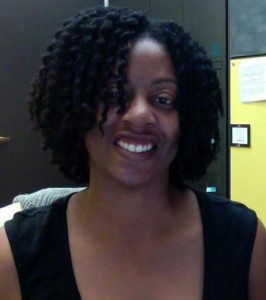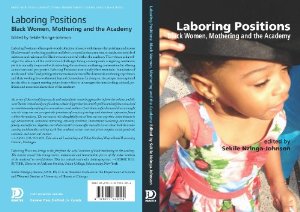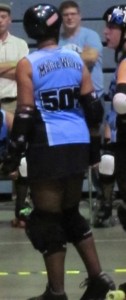Laboring Positions: Black Women, Mothering and the Academy (A conversation with editor Sekile Nzinga-Johnson)
Sekile Nzinga-Johnson is a BADDDDD sista in the Sonia Sanchez sense. She is a mother, educator, scholar, ruler of the roller derby scene as Malice Walker AND the editor of the powerful recent collection Laboring Positions: Black Women, Mothering and the Academy. If I didn’t have an essay in this book (“Daughter Dreams and the Teaching Life of Audre Lorde”…let me know what you think…) I would STILL be recommending it to you as one of the most nuanced discussions of the experiences of black women and mothers as academic workers anywhere. Laboring Positions not only represents a range of intellectuals and approaches to the topic of mothering and the academy, but also provides visions for transforming intellectual labor and the world we can create. I was thrilled to have a conversation with Sekile about her work on this book and her insights as a genius making her own rules!
APG: I love the anecdote you open the book with about watching a commercial for a for-profit university where a (female) student (of color) refers to her (black female) professor as a “second mom.” Was that the moment you decided to create this book?
SNJ: Yes, that commercial beautifully and irritatingly frames many of the critiques that I put forth regarding the feminized and marketized practices of the contemporary academy as well as the problematic nature of essentialist constructions of mothers used in current academic mothering discourse. However, I actually decided to write the book after spending years trying to talk myself out of writing the book. I had been afraid that this topic would be viewed by my peers as not “intellectual enough” or “too personal”. Even among some of my fellow feminists, motherhood is still considered not a radical enough intellectual project and so I was hesitant for years. I also feared the consequences of changing the direction of my scholarly agenda. It was during a writing retreat where I was considering my post-graduate school research agenda that the loud silences of Black women’s experiences in the academy kept haunting me and finally pushed me forward. I also had just read Mama PhD by Elrena Evans and Caroline Grant and was struggling with the white liberal feminist perspective direction they took in examining the coexistence of mothering and academic life. I viewed reproduction, motherhood and maternal labor in very different ways and I could not reconcile these racialized and gendered formations with the emerging discourse from (bio legal) academic mothering. My thinking on this topic has sharpened and become more emboldened since I developed the CFP for the book but I give much of that credit to my co-contributors. Their courageous and intellectually stimulating collective work of Black women’s experiences of mothering gave the book its current form and I am so proud that they agreed to join me on this truth-telling journey.
APG: In your chapter you shared stories about being pregnant in graduate school and being discouraged by mentors and supervisors from getting pregnant…through being your friend on Facebook and some of our other conversations I have gotten to see edges of your mothering awesomeness and your incredible kids. Can you talk a bit about your own experiences being a mother and academic worker now?
SNJ: Hmmm. Good question. I used to struggle that my scholarly interests might be read by others as being too subjective, too personal and it took me a while to insert my own mothering narrative into the book. But I suppose I needed to model much of what I tell my own children to do, which is “speak the truth even if your voice shakes” (Audre Lorde). Having said that, I could speak volumes on how I view these two sometimes, converging spaces of my life but I’ll try to keep it brief. I also want to try to answer this question without sounding essentialist or romanticize either of these locations that I occupy. I feel like my children have radically and positively shaped my intellectual thinking and my activist impulses. They hold me accountable to myself and to others. They have always been part of my academic journey and I refuse to hide, minimize or ignore this fact. My partner and I and yes, I mean PARTNER, have struggled through this thing called parenthood and academic life and we are proud of our work together. We finished our dissertations with a new-born and a toddler but we pulled each other across the line. We have worked hard to raise our children to be fearless, critical thinking and humane people who enjoy life. We have tried to model these values by living our lives authentically, contradictions and all. We do not hide our past or present struggles from them. Despite my newfound middle class status and the class privilege that come with it, I am politically aligned with class and labor struggles and justice struggles more broadly. The things I discipline my children most often center on ungratefulness (an unfortunate by product of privilege), not being compassionate to others and not speaking truth to power. I feel blessed that they are growing in this light. Some might say it is because I chose to parent 3 children that I have been less productive than most scholars my age. I disagree, my words and ideas came when my mind and my spirit were ready to share with the world. I do not think it is an effective use of my time to care about what those folks think. My journey is my journey. I am growing and stretching myself everyday as a feminist educator and maternal studies scholar. My journey is my journey…and I have found my voice.
APG: If you had to give advice right now to a pregnant/soon to be mother by other means black woman scholar what would you say?
SNJ: I would say what others have said before me and also have modeled. Surround yourself with people who believe in you and who will hold you accountable to yourself and your vision. Forgive yourself. Dance in the margins.
APG: In the book you talk about the privileging of “disembodied individualism” in the academy and highlight black women’s resistance to create “embodied intellectual space.” Could you talk more about this? I think this is one of the most exciting opportunities in the book. What are tangible ways to enact embodied communal intellectual space without being susceptible to co-optation and exploitation?
Yes, the academy, like most institutions is a patriarchal space that demands that one must be exclusively committed to an intellectual life devoid of connections to others and interests to other ventures. In doing so it penalizes all intellectuals that attempt to acknowledge their desire for wholeness or balance in their lives. For some, these desires may include motherhood but for most it may simply mean desiring a life outside of work and authentic connections to other people and ventures. The academy, particularly research institutions, also encourages competition and often discourages collaboration. This practice isolates women, people of color and anyone else who is marginalized. Faculty gain prestige for “leaving their footprint” on their field, for producing “objective” scholarship, and many are discouraged to minimize their connections to family and community to “get their work done.”
Laboring Positions speaks to Black women’s existence in the academy in a nuanced way that embraces both their intellectual lives and their connections to others. Many note that the role of mother has been a politicizing space and served to advance their academic and activist work. Others, resist viewing the academy as a space to gain individual success. For example, Giovanni Dortch and Candice Bledsoe’s chapter, Communal Property, creates new narratives about who does the “work” and how intellectual accomplishments are the shared products of communal labor. Their work pushes back against individualism and reclaims the education that has been denied by our foremothers. I strongly believe, that we must resist buying into elitist, patriarchal models of success if we are ever to transform the academy. I feel that it begins with us accepting faculty and students as whole people with connected lives.
APG: In the introduction you talk about the way that black feminists have “disentangled reproduction from mothering practices”? How does this distinction show up in the way you conceptualized and realized this book? What is the difference between the labor of creating the book and the ongoing labor of guiding it in the world now?
SNJ: Black feminists have always troubled US Black women’s motherhood and reproduction given the atrocities that they have faced here in the US. By necessity much of our mothering practices have been social as well as biological. Additionally, Black women’s reproduction has historically been controlled by the state and other institutions yet our reproductive labor has always been expected and imposed. This understanding of Black feminist thinking on reproduction and motherhood informs my reading of mainstream academic mothering publications as well as institutionalized responses to addressing the challenges of academic mothers. Neither seemed to grapple with mothering outside of bio-legal formations. I argue that these oversights in the discourse and in the development of institutional policies point to a need to bring voice to a more complex interpretations of mothering and the academy that is grounded in the lived experiences of many of the academic women that I have come into contact with over the years. Their racialized maternity was often assumed, imposed, ignored and/or marginalized.
Their loud silences gave me the courage to take on this project. The labor of creating this book was arduous as I was a full time professor at a small teaching intensive liberal arts college, a director of a Women and Gender Studies undergraduate program, a mother of 3 children who was isolated from extended family support, a partner of an academic and as many of my friends know, a roller derby player for Roc City Roller Derby (Malice Walker). At the same time, I was driven to document the multifaceted ways in which Black women experience mothering as academics. I must confess that promoting the book is a difficult task for me because I am somewhat modest. I feel like the book will get into the hands that appreciate it. I suppose I embrace the organic nature of what books spark our interest and feed our spirits. However, I am so delighted to have this conversation with you and the readers of The Feminist Wire!
APG: At the end of the introduction you allude to what it would mean to take collective action and institutional ownership of intellectual spaces acknowledging that the labor of black women has been a primary resource in that space. What does that look like? What are our opportunities to collaborate within and outside of the academy in the service of the intellectual liberation of black women and black mothers in the academy?
SNJ: I feel that institutions can no longer ignore the invisible abundance of care labor that black, women of color and queer faculty perform on behalf of institutions. That work often takes the form of engaged pedagogy and teaching, diversity initiatives, student recruitment and retention, community engagement and intellectual contributions and financially benefits institutions. These marginalized faculty are often the standard bearers of their institutions’ mission and vision statements. Yet, these same groups are underrepresented in the general body of full time tenure track and tenured faculty. As many have said before me, teaching, service, activist and collaborative work all deserve greater weight in tenure and promotion processes. I believe that those faculty and administrators with access to power, including women of color and feminists, must do their part in confronting and changing how intellectual and academic “work” is viewed and rewarded. I also feel that academics must be transparent about the working and material conditions of the academic workers with those outside of the academy. Our struggles, while with some degree of social capital and privilege, often parallel our struggles outside the academy. We must be careful of the elitist positions that we are encouraged to adopt and continue to be invested in struggles (and joys) outside of the academy if we desire liberation.
APG: In the introduction among the forms of other mothering you mention is “sister-mothering.” Can you say more about sister mothering? I am especially interested in how discourses of sisterhood (in the feminist sense and in the black women’s community building sense) overlap or contradict with narratives about mothering…
SNJ: Another good question, I function best within this framework both socially and professionally. I am not sure if it is a misnomer but I suppose I am embracing the various ways in which care work can be deployed and wanted to capture those nurturing relationship dynamics that offer a flattened power structure. We tend to think of the necessity hierarchal relationships that parents and other authority figures provide but I feel there is benefit from peers who reciprocally nurture each other. This has been my experience in life. My peers, most who are friends from high school and college, are who takes care of me emotionally, spiritually and intellectually. My high school friends helped me to choose and research colleges. My college friends helped me to prepare for grad school. My grad school friends challenged my anti feminist thinking and paid my bills when I could not. They became my chosen family, my chosen communities. These are the spaces where I can come undone and be put back together again. It is in their laps that I cry (and curse) most loudly. In my professional space, I feel that peer mentoring minimizes institutionalized power dynamics and hierarchies while capitalizing on the resource sharing and professional support that one often needs in their career. I do feel that this form of community building is essential for our survival in and outside of the academy. It is the foundation for political struggles and alliance building across our imagined boundaries. When others in power (including mothers/parents) command our participation out of duty, respect, obligation, fear I am not sure if those are always authentic interactions. Sisters/peers tend to understand power as a tool for navigation but may not hold that power as a position of authority and dominance.
APG: Who have been people who have mothered you? In the acknowledgements you mention a powerful sister circle that supported you while you created this book. Is there anyone you want to shout out at this moment?
SNJ: Yes, well I alluded to their influence in my life above but my childhood friends from Providence, RI and my college friends from Morgan State University, and my graduate school friends/mentors from Ohio State University, and the University of Maryland all hold very special places in my heart. They knew me when I had nothing, have watched me grow without judgment, and they provide for me in ways that are enumerable .
APG: What is on the horizon for you academically and otherwise?
SNJ: Well, I recently began a faculty position at the University of Illinois at Chicago in the Department of Gender and Women’s Studies. I am privileged to have more funding to continue my work with Black women and other women of color in the academy. Several of the chapters in Laboring Positions focused on Black women’s experiences as non-tenure track faculty. In the age of neoliberalism, this is a feminized and racialized class struggle that feminists should be paying attention to and be concerned with. I am pleased to be working at a unionized university, where I have joined the struggle to gain for the rights of my hard working and deserving peers regarding basic resources such as job security, better pay, parental leave and benefits, faculty resources, etc. I am also beginning to collect data the working lives and material conditions of non tenure track women of color faculty and am looking for participants to interview and participate in focus groups. I am new to the Chicago area so I am also trying to put down roots here and have become familiar with several local initiatives. The Chicago Abortion fund is doing amazing reproductive justice work on behalf of local women and girls and I hope to be more active with their initiatives. I also have been exploring becoming trained as a full spectrum doula, so that I would be able offer support to women and girls across their reproductive lives. I also am enjoying the wellness and fitness culture here in Chicago and am preparing to run in my second half marathon since moving here. Yes, the horizon is bright and full for me but as I alluded earlier, I am exactly where I am supposed to be in the world.
********
Click here to get the BRILLIANT collection Laboring Positions: Black Women, Mothering and the Academy! And remind your library to get a copy or two too!!




Pingback: Gumbs Interviews Sekile Nzinga-Johnson, editor of Laboring Positions: Black Women, Mothering and the Academy | Diaspora Hypertext, the Blog